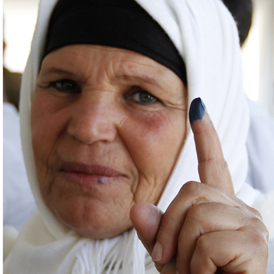Tunisia ‘electric’ after elections
The moderate Islamic Ennahda party has claimed victory saying it has won over 40 per cent of votes. Channel 4 News gauges reaction from the first democratic election of the Arab Spring.

Ennahda claims it has won 90 out of 217 seats on an assembly that will sit for one year to draft a new constitution and appoint a new interim president and government ahead of fresh elections in 2013.
The leaders of two leftist parties, the Congress Party for the Republic (CPR) and Ettakatol, said they were fighting for second place, while the leader of the centre-left secularist Progressive Democratic Party (PDP) conceded defeat on Monday evening.
But votes are still being counted two days after an unprecedented 90 per cent of Tunisians went to the polls, with an official result expected later on Tuesday.
‘Renewed sense of self’
The Independent High Authority for the Elections (ISIE), tasked with delivering the result of the country’s first ever democratic elections, has – in the space of a few months – written new electoral rules and created an electoral list of more than 11,000 candidates representing over 80 parties.
It has won praise from a delegation sent by the National Democratic Institute, a US-based organisation that helped monitor Sunday’s vote.
“This election to me was hands down the best, the most promising I’ve ever seen, including in the United States,” Jane Harman, president of the Woodrow Wilson International Center and former US congresswoman from California, said at a press conference in Tunis.
Faisal Dhou, a journalist connected with the election monitoring website TunisiaLive.Net, told Channel 4 News that the people in Tunisia “now have a renewed sense of self.”
“The atmosphere is electric, everybody is happy, this is truly historic for the Tunisian people.”
However he added that one group of protesters – who Reuters earlier said numbered around 30 – are outside the electoral commission calling on authorities to take action over what they said were alleged violations of the electoral code by Ennahda and other parties.
Mr Dhou said there “were maybe no more than 100 protesters there.”
Live: Tunisian election results from monitoring group

Coalition partners
The voting system has built-in checks and balances, meaning Ennahda will have to seek coalition partners.
Ali Larayd, a member of the party’s executive committee, said Ennahda is ready to form an alliance with the Congress for the Republic and Ettakatol, which are both secularist.
One of the most prominent secularist parties, the PDP, which has conceded defeat, says it is now preparing for opposition.
“The trend is clear. The PDP is badly placed. It is the decision of the Tunisian people. I bow before their choice,” PDP leader Maya Jribi told the AFP news agency at her party’s headquarters in Tunis earlier in the day.
“We will be there to defend a modern, prosperous and moderate Tunisia,” she said, adding the PDP would “clearly be in opposition”.
Manoubia Bouazizi (pictured left), the mother of Mohamed Bouazizi, who set himself on fire in an act of protest which inspired the Arab Spring, urged whoever wins the election to honour her son’s sacrifice by helping poor people like him.
Read more: Sidi Bouzid, the roots of the Tunisia revolution
Ennahda revival
Ennahda’s claimed win is a turnaround for a party which just 10 months ago had to operate underground because of a government ban which saw hundreds of the party’s followers in prison.
It is led by Rachid Ghannouchi, who was forced into exile in Britain for 22 years because of harassment by former President Zine El Abidine Ben Ali’s secret police.
Mr Ghannouchi, who has been compared to Turkish Prime Minister Tayyip Erdogan for his moderate brand of political Islam, says he will not enforce any code of morality on Tunisian society or the millions of western tourists who holiday on the country’s beaches.
Tunisia’s strong secularist traditions go back to the first post-independence president, Habiba Bourguiba, who ruled the country for three decades before he was replaced by Ben Ali in 1987.
